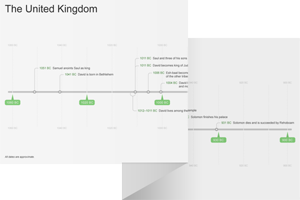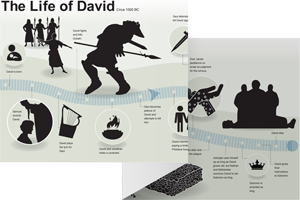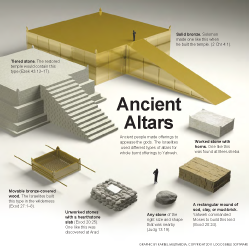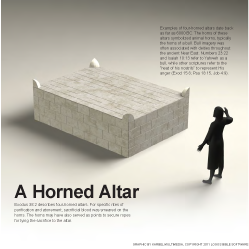1:1–4 Building on the narrative of 2 Samuel, 1 Kings |
1:1 A number of years seem to have elapsed between the events recorded in 2 Samuel and 2 Kgs 1. |
King David The youngest son of Jesse, David, was a shepherd boy from Bethlehem in Judah when Samuel anointed him king in place of Saul (1 Sam 16).
(1 Sam 16).
King David was a skilled warrior (1 Sam 17; 2 Sam 8) and a man after God’s own heart (1 Sam 13:13–14). He reigned for 40 years (1011–971 bc): seven years in Hebron and 33 years in Jerusalem. |
had become old, advanced in years The Hebrew phrase used here, zaqen ba bayyamim, occurs only three times elsewhere in the ot: Gen 24:1 in reference to Abraham; Josh 13:1 and 23:1 in reference to Joshua. Its usage here identifies David with two of Israel’s greatest figures.
1:2 a young virgin The Hebrew phrase used here involves two terms: bethulah, which refers to a virgin, and na’arah, which refers to a young girl or female attendant.
Let her be of use for him The Hebrew phrase used here, thehi lo sokheneth, may be literally rendered “she shall be a benefit to him” or “she shall be of service to him.” The Hebrew word sakhan comes from the Akkadian word sakânu, meaning “to care for.” The feminine form (sokheneth) only occurs here and in 1 Kgs 1:4 (compare Isa 22:15).
word sakhan comes from the Akkadian word sakânu, meaning “to care for.” The feminine form (sokheneth) only occurs here and in 1 Kgs 1:4 (compare Isa 22:15).
1:3 the territory of Israel David expanded the borders of Israel in all directions by battling the Philistines (2 Sam 5; 8:1), Amalekites (1 Sam 30), Edomites, Moabites (2 Sam 8), Ammonites, and Syrians (2 Sam 10).
Abishag the Shunnamite Abishag was from the northern town of Shunem (modern-day Solem), located in the Jezreel Valley near Mount Gilboa (1 Sam 28:4) and Megiddo.
(modern-day Solem), located in the Jezreel Valley near Mount Gilboa (1 Sam 28:4) and Megiddo.
1:4 but the king did not have sexual relations with her The Hebrew text insists that David did not “know” Abishag (using a Hebrew euphemism for sexual intercourse) because his eldest living son, Adonijah, later asks to marry her after David’s death (1 Kgs 2:13–25); Lev 18 prohibits men from having sexual relations with their father’s wife and relatives (see note on Lev 18:1–30).
1:5–10 Like Absalom, his rebellious brother, Adonijah amasses chariots, horses, and footmen (2 Sam 15:1; 1 Kgs 1:5). He also was considered to be handsome (see 1 Sam 9:2 and note; 2 Sam 14:25; 1 Kgs 1:6). As David’s eldest surviving son, Adonijah represents the most likely candidate for the throne, because David’s son Absalom has already died (2 Sam 18:14–15). However, high-ranking officials did not agree on whether he should be king. |
1:5 Adonijah Means “Yahweh is my lord” or “Yahweh is my master.”
I will be king Parallels with Absalom’s rebellion suggest that Adonijah was planning a military coup (compare 2 Sam 13–18).
he prepared for himself a chariot and horsemen In order to go on royal procession throughout the city. This amounted to a formal declaration of his kingship (1 Kgs 1:11).
1:6 Absalom See 2 Sam 3:3, 13–18.
1:7 Joab David’s nephew and the commander of his army (2 Sam 8:16; 20:23).
and the commander of his army (2 Sam 8:16; 20:23).
Abiathar One of David’s high priests and a life-long supporter (1 Sam 22:20; 2 Sam 20:25).
1:8 Zadok David’s other high priest (2 Sam 8:17; 20:25). The high priesthood eventually would belong solely to Zadok’s descendants.
Benaiah The commander of David’s bodyguard (see note on v. 38; compare 2 Sam 20:23; 23:20–23).
Nathan The prophet who advised David and delivered the Davidic Covenant (2 Sam 7). Nathan will support Solomon in the establishment of his reign (1 Kgs 1:8, 34, 38, 45).
who advised David and delivered the Davidic Covenant (2 Sam 7). Nathan will support Solomon in the establishment of his reign (1 Kgs 1:8, 34, 38, 45).
Shimei, Rei Their identities are unknown, but the former may be associated with the Shimei of 2 Sam 16:5–14.
mighty warriors were David’s A group of warriors who supported David during the period before his kingship. Their names and exploits appear in 2 Sam 21:15–22; 23:8–39 and 1 Chr 11:10–47.
1:9 the stone of Zoheleth The Hebrew phrase used here, even hazzocheleth, comes from the word zocheleth, meaning “to crawl, creep.” The stone marks a sacred spot.
marks a sacred spot.
En Rogel A spring close to Jerusalem, on the border between the tribal lands of Benjamin and Judah (Josh 15:7; 18:16).
close to Jerusalem, on the border between the tribal lands of Benjamin and Judah (Josh 15:7; 18:16).
all the men of Judah, the servants of the king The Hebrew wording used here literally means “all the men of Judah, servants of the king.” Like Absalom, Adonijah rallies support from his tribe (2 Sam 15:9).
1:11–27 In their conversation with David, Nathan and Bathsheba appeal to an oath not included in the books of Samuel or 1–2 Kings. Nathan advises Bathsheba to speak to David to preserve her life and the life of her son, Solomon—presumably because Adonijah would kill them once he became king, to avoid a threat to the throne (1 Kgs 1:12). Solomon does not play an active role in this plot until after he assumes the throne (v. 46). |
1:11 Bathsheba The widow of Uriah the Hittite (2 Sam 11).
David watched Bathsheba while she bathed (2 Sam 11:2) and had sex with her while her husband, Uriah, was at battle (1 Kings 11:3–5). At first, David tried to hide the affair; when that plan failed, he had Uriah killed (2 Sam 11:6–25). After a period of mourning, Bathsheba became David’s wife and gave birth to their child (2 Sam 11:26–27). The child died (2 Sam 12:15–23), but the couple conceived again and Bathsheba gave birth to Solomon (2 Sam 12:24–25). |
our lord David does not know Although David still has the authority to make important decisions, his condition has deteriorated such that he is no longer informed about the happenings in his own kingdom.
1:15 went to the king in the private room Bathsheba enters the king’s chamber without ceremony (see note on 1 Kings 1:17, 1:28). She follows the basic rules of royal etiquette by bowing and waiting to be addressed before speaking (vv. 16–17).
the king was very old Reference to David’s frailty appears throughout chs. 1–2 (e.g., vv. 1–4).
Abishag Her presence makes her a witness to the following conversation.
1:17 your servant Bathsheba appeals to David as his servant or handmaid, rather than as his wife (compare 2 Sam 11:27). However, her relationship to him was less formal than that of his closest followers (see note on 1 Kings 1:15; note on v. 23).
1:19 oxen and sheep and fattened animals This phrase only occurs twice in the ot (see v. 25).
the sons of the king David had 17 sons: 6, including Adonijah, during the 7 years he reigned from Hebron (2 Sam 3:2–5), and 11, including Solomon, during the 33 years he reigned from Jerusalem (2 Sam 5:14–16).
Abiathar See note on 1 Kgs 1:7.
Solomon your servant Similar to how she refers to herself in v. 17, Bathsheba refers to Solomon as David’s servant rather than his son. If the Israelites were practicing primogeniture, Solomon would be second in line to the throne after Adonijah.
1:21 sinners The Hebrew word used here, chatta'im, comes from the word chata (meaning “miss,” “go wrong,” “sin,” or “incur guilt”). Often used in ritual contexts, it can also be used in other settings (e.g., 2 Kgs 18:14).
1:23 Nathan the prophet is here Nathan’s arrival is formally announced, whereas Bathsheba simply enters the king’s chambers (1 Kgs 1:15, 28).
1:25 Long live King Adonijah Here, Nathan claims that the people, not merely Adonijah and his followers (as in vv. 5, 11, 18), are supporting Adonijah’s reign.
1:28–53 David acknowledges his oath concerning Solomon and swears before Nathan, Bathsheba, Abishag, and the others in the king’s chamber that it will be fulfilled (vv. 28–31). Zadok, Nathan, and Benaiah immediately perform the succession ceremony per David’s instructions (vv. 32–40). As a result, Adonijah and his followers become afraid and disband (vv. 41–53). Adonijah seeks asylum by grasping the horns of the altar (see Exod 21:14) until Solomon promises to spare his life and sends him home (1 Kgs 1:50–53). |
1:28 stood in his presence See note on v. 11; note on v. 15; note on v. 23.
1:29 has saved my life from all trouble David uses the same oath terminology when angered by the murder of Saul’s son, Ish-Bosheth (2 Sam 4:9).
1:31 with her face to the ground The Hebrew phrase used here, appayim erets, literally means “nostrils [to the] ground.” It occurs only here and in Isa 49:23, where royalty is again the subject.
May my lord, King David, live forever While Bathsheba responds properly with this exclamation, it is ironic given the context of David’s quickly approaching death.
1:33 the servants of your lord Later specified as the Cherethites and Pelethites (1 Kgs 1:38 and note; see 2 Sam 8:18 and note), who are under the command of Benaiah (2 Sam 20:23).
mule The Hebrew word used here, pirdah (also rendered as pered) refers to the offspring of a male donkey and female horse; this animal was preferred by the upper classes and royalty during this period (2 Sam 13:29; 18:9). The “ass” or “donkey” (chamor) more commonly served as a means of transport (see Num 22:22; 1 Sam 25:42; 2 Sam 16:2; 1 Kgs 13:13; Zech 9:9) and beast of burden (see Gen 49:14–15). David’s and Solomon’s use of a mule may be connected to Deut 17:16, which prohibits Israel’s kings from amassing horses. When Jesus enters the city of Jerusalem on a donkey, the crowd interprets Jesus’ action as a claim to royalty in light of Zech 9:9 (see John 12:13–15; Matt 21:7), which envisions a righteous and humble king riding on a donkey (chamor)—an animal used by commoners. Although David and Solomon ride a pered (mule)—not a chamor (donkey) like Jesus—John 12:12–15 may be read as a claim to the throne of David’s eternal kingdom (2 Sam 7:13), because of Zech 9:9 (compare Matt 1:6–16).
Gihon From the Hebrew word gayach, meaning “gushing” or “breaking forth.”
1:34 the trumpet A shofar or ram’s horn, mainly used as a signaling device, not a musical instrument.
The shofar was a ram’s horn |
Long live King Solomon This exclamation stands in tension with those of Adonijah’s followers (v. 25).
1:35 leader over Israel and Judah In v. 34, David instructs Zadok and Nathan to anoint Solomon as king over Israel; here, the text distinguishes between Israel (the northern tribes) and Judah (the southern part of the kingdom).
1:38 Kerethites, and the Pelethites Refers to part of David’s personal mercenary forces (2 Sam 20:23) under the command of Benaiah (see 2 Sam 8:18 and note; 1 Chr 18:17). They also supported David when he fled from Absalom (2 Sam 15:18) and when Sheba rebelled (2 Sam 20:7). They do not appear in the biblical record after David’s death and may have been disbanded.
the mule of See note on 1 Kgs 1:33.
1:39 the horn of oil Zadok must have taken the oil to Gihon in anticipation of Solomon’s anointing. Such oil would have been made by a perfumer and mixed with costly spices (Exod 30:23–33).
the tent Likely refers to the tent of Yahweh (1 Kgs 2:28) that was pitched in the city of David to house the ark of the covenant (2 Sam 6). See note on Exod 27:21.
he anointed Solomon Echoes the consecrations of both Saul (1 Sam 10:1) and David (1 Sam 16:1–13; Psa 89:20). In 1 Kgs 1:34, David charges Zadok and Nathan with anointing Solomon; but only Zadok, the high priest, performs the ceremony here. In contrast, Saul and David were both anointed by Samuel.
the people Likely includes regular citizens who were drawing water from the spring at Gihon at the time of Solomon’s arrival.
at the time of Solomon’s arrival.
1:40 were playing on the flutes Pipes were played on festive occasions (Isa 30:29), such as the transfer of the ark of the covenant to Jerusalem (2 Sam 6:5).
1:41 Adonijah and all the invited guests See note on 1 Kgs 1:9.
Why is there such a noise in the city ? Instead of the expected Hebrew word (ir), Joab uses its poetic equivalent (qiryah)—a term which also occurs in Deut 2:36.
1:42 Jonathan the son of Abiathar Jonathan also was the messenger who brought word of Absalom’s rebellion (2 Sam 15:27–28, 36; 17:17–21).
also was the messenger who brought word of Absalom’s rebellion (2 Sam 15:27–28, 36; 17:17–21).
1:44 the king’s mule See note on 1 Kgs 1:33.
1:47 Your God has made the name of Solomon better than your Refers to fame and reputation achieved through brave deeds (2 Sam 7:23; 23:18, 22).
his throne greater than your throne Echoes Benaiah’s blessing in 1 Kgs 1:37.
the king worshiped on the bed Indicates that, despite being bedridden, David still showed gratitude.
1:48 has given this day one sitting on my throne David recalls the covenant that Yahweh made with him in 2 Sam 7:12 (compare 1 Kgs 3:6). This covenant is particularly important in the Gospels of Matthew and Luke, which trace Jesus’ genealogy
that Yahweh made with him in 2 Sam 7:12 (compare 1 Kgs 3:6). This covenant is particularly important in the Gospels of Matthew and Luke, which trace Jesus’ genealogy through David’s line (Matt 1:6–16; Luke 3:23–32).
through David’s line (Matt 1:6–16; Luke 3:23–32).
1:50 grasped the horns of the altar Someone who inadvertently committed certain crimes could seek asylum by grabbing the horns of the altar (Exod 21:14). See note on Exod 27:2.
1:52 not a hair of his head will fall Similar oath language occurs when the people protect Jonathan from Saul’s oath (1 Sam 14:45) and when David spares the son of the woman from Tekoa (2 Sam 14:11).
evil is found in him His act in 1 Kgs 2:13–25, possibly a second attempt to secure the throne (see v. 4 and notes, v. 5 and notes), is perceived as wickedness and results in his ultimate downfall.
1:53 Go to your house Solomon deals with Adonijah in the same way that David dealt with his rebellious son, Absalom (2 Sam 14:24). Adonijah is pardoned, so long as he keeps out of official business.

|
About Faithlife Study BibleFaithlife Study Bible (FSB) is your guide to the ancient world of the Old and New Testaments, with study notes and articles that draw from a wide range of academic research. FSB helps you learn how to think about interpretation methods and issues so that you can gain a deeper understanding of the text. |
| Copyright |
Copyright 2012 Logos Bible Software. |
| Support Info | fsb |
 Loading…
Loading…




 David
David 



 Shofar
Shofar 
